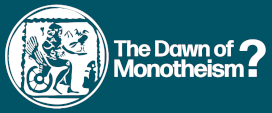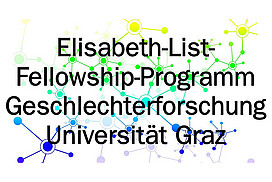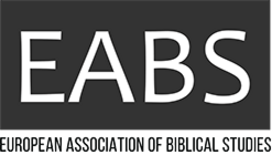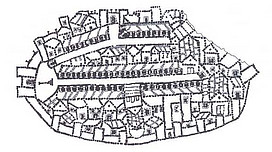Gastvorträge
17.1.2024 10:00 HS 47.01 und 13:30, HS 47.11: Vorträge von Filip Čapek
Prof. Dr. Filip Čapek von der theologischen Fakultät der Karls-Universität Prag wird am 17.1. in Graz sein und Vorträge zu den Themen "The Ark Narrative: Designing a New Perspective" und "Cult Transformations in Iron Age IIA/B Judah: Between Archaeology and Texts" halten. Prof. Čapek ist Spezialist für Weisheitsliteratur, Kulte der südlichen Levante und Biblischer Archäologie. Er koordiniert die tschechische Teilnahme an den israelischen Ausgrabungen Tel Moza und Tel Azekah.
6.12.2023 13:30, HS 47.11: Danilo Verde: Making Sense of the Non-Sensical: Reading the Communal Laments within Books II and III of the Psalter
Biblical trauma studies tend to emphasize the therapeutic dimension of narrative and poetic representations of catastrophic events. However, other dynamics that require attention and are often overlooked are also at work in trauma texts and discourses. Particularly common among these are mechanisms of self-blame and attribution of responsibility. Such mechanisms can be observed in the way the psalms of communal lament were included in Books II and III of the Psalter, and “framed” by the redactors within their theological agendas. Combining redaction criticism and insights from trauma studies, this lecture shows how the redactors of Books II and III of the Psalter sought to attribute responsibility for the Babylonian catastrophe to the entire people of Israel and, in this way, to make sense of the
chaos and the disorientation emerging from the communal laments individually taken.
Vortragseinladung (pdf)
5.12.23 11:45, SR 47.11: Danilo Verde: The Side-Lining of the Pain of Women in the Hebrew Bible
The relationship between pain and gender is currently one of the most debated topics in pain studies. Scholars have analysed the extent to which cultural constructions of gender impact experiences of physical suffering and how these experiences are represented in various historical and cultural contexts. Within biblical studies, however, the relationship between pain and gender has not been fully addressed. The present lecture aims to help fill this gap by showing that the patriarchal and androcentric society of ancient Israel resulted, among other things, in the marginalization of women’s pain in the texts of the Hebrew Bible. The physical suffering of women, whether real women or literary constructions, remained largely unspoken, untold and therefore unheard.
Vortragseinladung (pdf)
20.6.2023, 15:15 HS 47.11: Mediterranean Connections: The Figurines from Amargeti on Cyprus
In the small village of Amargeti, Cyprus, an excavation was carried out by D. G. Hogarth as early as 1888. The sanctuary excavated aroused particular interest because of the inscriptions dedicated to Apollo or Opaon Melanthios, a deity not otherwise known in Cyprus. The exact location of the sanctuary is uncertain due to a lack of photographs and mapping. However, survey campaigns were carried out in 2019, 2021 and 2022 by the University of Graz, in cooperation with the Department of Antiquities in Nicosia, the Archaeological Museum of the Paphos District and the Cyprus University of Technology in Lemesos. Surprisingly, two sites, located in the areas Petros Anthropos and Asomatos, produced finds which are strong indicators for religious activities. In the course of these activities on the Asomatos site, a large number of small-format as well as a small number of large-format terracotta fragments came to light. They belong to Archaic, Classical, and Hellenistic human and animal figurines which probably were dedicated as votives to a specific deity. Apart from body fragments and limbs a considerable number of heads were collected. These heads depict only males, thus corroborating a cult of a male deity on this site. The analysis of the Asomatos figurines will contribute to a more concise understanding of the kind and duration of votive activities on this site and its entanglement in the dense network of Cypriot sanctuaries.
Vortragseinladung (pdf)
7.6.2023, 13:30 SR 47.14: Competing Concepts of Covenant in the Hebrew Bible: Grant and Obligation
This lecture will introduce two core concepts of covenant found in the Hebrew Bible, with particular emphasis on the variety of ways in which the two concepts interact.
Benjamin Sommer is Professor of Bible at the Jewish Theological Seminary (New York) and Senior Fellow at the Kogod Center for Contemporary Jewish Thought of the Shalom Hartman Institute (New York/Jerusalem). His books, Revelation and Authority: Sinai in Jewish Scripture and Tradition (Yale, 2015), The Bodies of God and the World of Ancient Israel (Cambridge, 2009), and A Prophet Reads Scripture: Allusion in Isaiah 40–66 (Stanford, 1998), received multiple prizes. The Israeli newspaper Ha’aretz described Sommer as “a traditionalist but an iconoclast – he shatters idols and prejudices in order to nurture Jewish tradition and its applicability today.”
Vortragseinladung (pdf)
6.6.2023, 19:00 Heilandskirche: "Alles, was Atem hat, lobe den Herrn!" Die Psalmen im interreligiösen Gespräch
Round Table mit Repräsentant*innen von Judentum, Christentum und Islam
Als „kleine Biblia“ (Martin Luther) spielt der Psalter eine herausragende Rolle in Judentum und Christentum. Dabei sind die Psalmen nicht nur Gebets- und Meditationstexte persönlicher Frömmigkeit, sondern haben auch eine zentrale liturgische Bedeutung: sei es beispielsweise im Synagogengottesdienst, im monastischen Stundengebet oder in Form der von den Psalmen inspirierten christlichen Lieddichtung. Auch dem Koran ist der Psalter als Teilcorpus der Bibel ein Begriff. Sure 17:55 erwähnt eine David zugeordnete Schrift mit der Bezeichnung zabūr ‚Psalter‘. Doch mehr noch als durch ihre konkrete Textform sind die Psalmen im Koran als liturgischer Typus präsent.
Über hundert koranische Psalm-Reminiszenzen und -Anklänge lassen den Psalter als einen wichtigen Bezugstext aufscheinen und bieten einen Einblick in die vielschichtigen Um- und Neudeutungen der Psalmen-Traditionen im Koran.
Detaillierte Einladung (.pdf)
6.6.2023, 15:15 HS 47.11: Phoenicians in Israel/Palestine: The Question of the Divine Couple
In this presentation, a Persian period terracotta figurine widespread in the Levant will be analysed: the seated man, with an atef-crown or a cylindrical tiara, and a hand touching his beard. As well as studying the specific attributes and the evolution of this iconography, the talk will address its association in cultic contexts with another figurine: the pregnant woman. By providing new arguments to identify the bearded man and the pregnant woman as (mainly) divine images, which are at the same time associated and distinct, it will be stressed that the idea of a divine couple in an “open relationship” is of pivotal importance in understanding the organisation of ancient polytheisms.
Vortragseinladung (pdf)
9.5.2023, 15:15 HS 47.11: Changing Perspectives on Cult and Religion in Judah during the First Temple Period: A View from the Cultic Precinct at Tel Moza Near Jerusalem
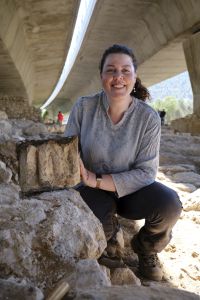
The ongoing discovery of a cultic precinct with a series of temples from the First Temple Period (10th to 6th c. BCE) at Tel Moẓa, less than 7 kilometers from Jerusalem, has rejuvenated the debate on the formation of religion in ancient Judah and Israel. The new finds include a monumental temple complex similar in architectural plan, size, and decoration to the Solomonic Temple in Jerusalem mentioned in the biblical texts, and to contemporary temples found in north Syria. The examination of the various phases of the precinct and their finds affords us an unparalleled opportunity to examine the development of cultic traditions and patterns of ritual activities in Judah in the context of ancient Near Eastern conventions. They indicate that the Solomonic temple in Jerusalem was neither the only temple in Judah nor was it necessarily the ‘First’.
Vortragseinladung (pdf)
18.4.2023 15:15, HS 47.11: The Venus of prehistoric times? The female figurines in the Pottery Neolithic
Katharina Streit (Austrian Archaeological Institute, Austrian Academy of Sciences)
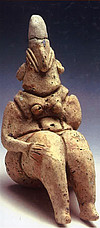
The southern Levant in the Pottery Neolithic (ca. 6300–5200 cal BC) saw an unprecedented frequency and homogenization in anthropomorphic depictions. Seated female figurines (often referred to as ‘Mother Goddess figurines’) uncovered in large quantities at Shaar Hagolan and at other sites ascribed to the Yarmukian culture are a prominent example of early artistic expression and have been frequently interpreted in light of the ‘Great Goddess Hypothesis’. However, the corpus of Neolithic anthropomorphic female figurines is much more varied and crosslinks between individual iconographic traditions become apparent. In this lecture, current interpretative models regarding function and meaning will be re-evaluated based on the detailed analysis of archaeological contexts and iconographic parallels in the southern Levant and beyond.
Picture: Female figurine from Shaar HaGolan, Pottery Neolithic (6400–5800 BCE) (IAA: 2002-1187)
Photographer: D. Harris (in: Garfinkel – Ben-Shlomo – Korn 2010, cover)
Short Bio – Katharina Streit
- undergraduate training in Archaeology and Anthropology at University of Oxford (BA in 2009) and Near Eastern Archaeology (MA, 2009, PhD, 2012 Hebrew University of Jerusalem)
- Postdoc at the Martin Buber Society of Fellows at Hebrew University (2016-2020)
- Since 2020 Postdoctoral researcher at the Austrian Archaeological Institute of the Austrian Academy of Sciences
- Director of the Ein el-Jarba excavations, a late Pottery Neolithic/Early Chalcolithic site in Israel (2013-2016)
- Since 2017, co-directing the Austrian Excavations at Tel Lachish together with Dr. Felix Höflmayer
- Research focus on transregional interactions from the Chalcolithic to the Iron Age in the southern Levant
Vortragseinladung (pdf)
Institutsleiterin
Katharina Pyschny
Institut für Alttestamentliche Bibelwissenschaft
